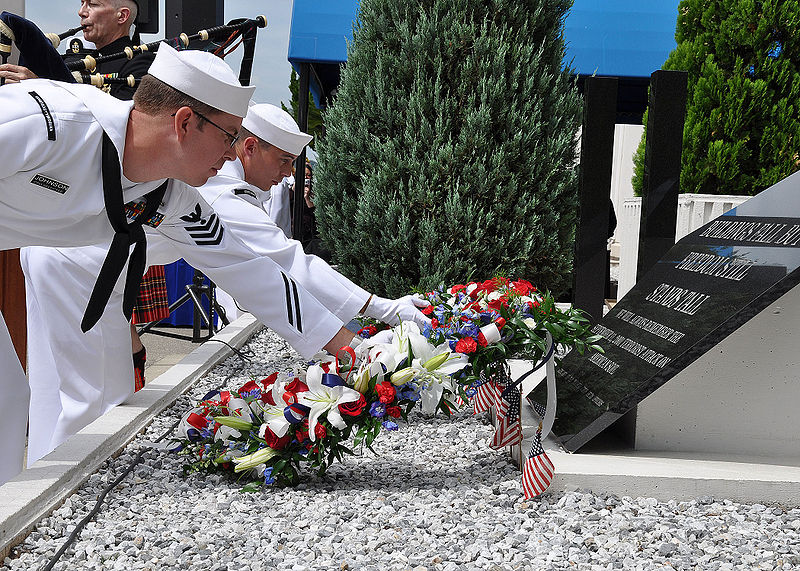
U.S. sailors honor those lost on 9/11 / Navy photo by Charles Oki
September 9th is my cousin Laura’s birthday. She would have been 62. She died Wednesday, of lung cancer, shortly after I arrived from a 14-hour marathon drive from Bremerton, Wash. On my way down, I prayed that she would die peacefully. Instead she died gasping for her last breaths. It was horrific and heartbreaking.
In this 10th anniversary week of the September 11 tragedy, many memorials and tributes are planned. Driving down and listening to NPR, I heard many survivor stories, many of whom have chronic lung diseases as a result of breathing in the toxic smoke, steam, and heat of the maelstrom that followed the terrorist attack on the twin towers and the Pentagon. After witnessing my cousin’s passing, I cringe at the thought of what those who did not survive endured in their last minutes. I am anguished at the thought of what those, who survived the attack, will have to go through in the future as the diseases they now suffer from take their toll.
Since the terrorist attacks, and as a result of the two wars that were initiated in retaliation, thousands of servicemen and women have died as well. Tens of thousands have had their lived inextricably altered due to the injuries they have sustained. But in the last 10 years, how have those of us, who are not in the military, who are not a military family, sacrificed for this war of terror we continue to fight? Besides the continued hassles of airline travel and the absolute power the TSA has over hapless travelers, not much. We are going through a recession partly as a result of the military war spending; many have lost their homes as a result, and though the banks and auto industry have been bailed out, the average consumer continues to struggle. Now, a Congressional commission is going to weed through the national budget and find “hard ways” for us to reduce spending and reduce the deficit.
In my mind, this means that those of us who have the least amount of resources, who need government assistance programs, who rely on the federal government for both their livelihood and their continued existence, will be the ones most affected. It means reducing military spending as well as cutting social services. What I hope happens is that the Commission can find ways to make the government more efficient while maintaining those quality of life services that are necessary to so many people.
Those people not only include people on Social Security, Medicare, food stamps, and other welfare programs, it also means Veteran’s services for those who were injured protecting our country, medical services for the survivors of the terrorist attacks, military retirees and widows who rely on federal benefits to live. What about Congress? When are they going to feel the brunt of this crisis? Why don’t they stand up and tell the American public that they too will sacrifice by reducing their salaries by 10%, and tying any future salary raises to the Cost of Living Allowance (COLA) that the rest of us must abide by? I have suggested this to my senators and congressman from Washington state. I have received no answer from any of them.
Similarly, when are corporations going to stand up and say, “we are willing to pay more in corporate taxes to keep this country strong”? But we do not see that happening, either. I think we as Americans are willing to make the sacrifices needed to get through this crisis…I would be willing to pay a little more in taxes to do so. I just wish our congressional “leaders” understood it as well, and showed the leadership it takes to do so…working together instead of at odds would be a really good start. I hate to see the sacrifices called for by Congress only affecting those with the least resources, while corporations and the rich continue to get a “bye”. And that includes Congress.


